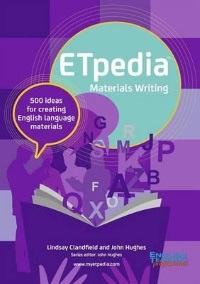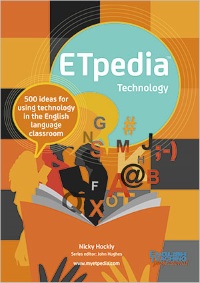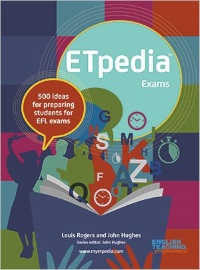New from ETpedia
We already have four new books lined up for 2018, as you will see below, as we continue to produce resources to support your professional development and teaching practice.

ETpedia Materials Writing
Almost every teacher needs to produce their own materials, but even the most experienced materials writers can need new ideas or fresh tips. ETpedia Materials Writing offers 500 ideas to help, covering everything from basic principles to extensive materials writing.
ETpedia Materials Writing is a complete reference guide for any English teacher looking to create their own materials. It is made up of units of 10 tips, which each provide advice and ideas for creating materials, from basic principles to more extensive material writing. These tips will inspire you whether you are writing materials for the first time or if you are simply looking to further develop your skills. It is the fourth book in the ETpedia series, a set of resources aimed at providing ELT teachers with everything they need in one accessible resource.

ETpedia Technology
2017 has seen the 10 year anniversary of the iPhone, voice activated-assistants from Amazon and Google finding homes across the country and much more. It is clear that technology is not only playing an increasingly significant role in society, but is also becoming more and more useful in the classroom. To help, ETpedia Technology offers 500 ideas and activities to help you get the most out of classroom technologies, whatever your capabilities and facilities.
Technology is becoming an ever more popular and useful tool in the ELT classroom. Whether you are already an avid user of technology or you are inexperienced but want to explore more, then ETpedia Technology is the resource you need. It suggests ways to use text-based tools, multimedia, smartphones and more, as well as providing easy-to-use activities and more general advice for using technology in the classroom. It also covers some of the important discussions around using technology, such as the safety of young learners and the question of plagiarism.

ETpedia Exams
Do you teach exam classes? ETpedia Exams offers you 500 ideas, tips and pointers, to help you ensure your students are prepared as possible, whilst also making sure their general English continues to improve.
10 questions with the co-author of ETpedia Exams
1 Who are you and what have you written for the ETpedia series?
My name is Louis Rogers and I am the co-author of the new ETpedia Exams title.
2 What’s your previous experience of exam courses?
I have taught a lot of different exam courses in different countries including FCE, CAE, CPE, IELTS and BEC. I have also taught exams for specific contexts such as EAP.
3 What’s your typical day like at the moment?
Most of my time now is spent writing various ELT courses for a range of publishers. I find you spend a lot of your time looking for new text ideas. Even when you read for pleasure you often find yourself reading an article and thinking about how it can be used to teach different language points. In the mornings I tend to focus on the harder draft one writing and in the afternoons, I tend to write simpler tasks, proof read, check and rewrite tasks.
4 Why do you enjoy teaching exam classes?
One of the pleasures I think is also one of the greatest challenges. The students are often very motivated because their success in the exam will have a direct impact on their future. However, this can also put pressure on the students and teachers to try to reach these targets. It’s definitely a more motivating context for both teachers and learners but there are pressures there because of this.
5 What is one of the biggest challenges for a teacher of exam courses?
When you are new to a particular exam it is challenging to get your head around the exam format and the best way to approach each task. However, I think for all teachers one of the greatest challenges is managing the expectations of students. It takes a long time for someone’s level of English to improve and students don’t always have the patience for this.
6 How did you go about planning and writing ETpedia Exams?
One of the first tasks was how to organise the book. We, myself and John Hughes, decided to focus on particular skill areas as there is actually a lot of common ground between a wide range of exams. We then worked on dividing each skill into key areas. Once we actually started writing we each led on different sections and then contributed additional ideas to each other’s pages.
7 What kind of teacher do you think will find this book useful?
Undoubtedly, the book will be useful to anyone who is new to teaching exams. It will also help when people are asked to teach a new exam they haven’t taught before. However, I think there are also some useful ideas for experienced teachers to add to their repertoire.
8 What did you learn from writing the book?
I think it reinforced how difficult exams classes can be to balance in terms of students perceived needs and actual needs. Students tend to be most motivated by exam practise, especially when time is tight. However, it’s important to integrate as much language work as possible rather than endless exam practice and feedback.
9 What’s your favourite classroom activity in the book?
I probably like the section on generating ideas and planning writing or the section on opinion based essays the most. Students often need a lot of practise in this. Some of the topics in the writing sections of exams can be quite abstract and look at topics students have never really thought about before. Using media, infographics, getting students to defend their position or consider other perspectives all really help to develop and shape their ideas.
10 What’s one piece of good advice that you once received from another teacher?
One of the most important pieces of advice was also one of the briefest. Diane Schmitt was my tutor on my MA in ELT at Nottingham Trent. On one module on materials writing her simple advice for analysing materials was to have the question in your mind ‘The students are busy, but what are they doing?’ Constantly, keeping this approach in mind really helps focus materials writing, lesson planning and teaching.
Plus in 2018, look out for ETpedia Teenagers, ETpedia Grammar and Best Practices in Blended Learning!



|